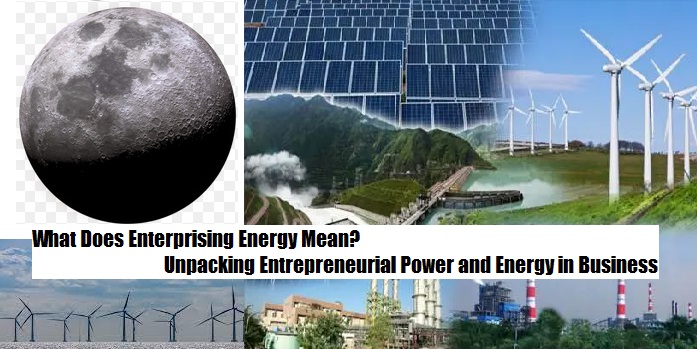What is Enterprising Energy?
Enterprising energy refers to the enthusiasm, passion, and drive that an individual or group brings to business ventures and innovation. This energy is fueled by creativity, resourcefulness, and the determination to bring new ideas to life. It is not limited to one’s physical energy level but includes mental agility and the motivation to turn visions into actionable steps.
At its core, enterprising energy is about harnessing the power to identify opportunities, take risks, and overcome challenges. This type of energy often correlates with a proactive mindset, where one sees possibilities rather than limitations. Entrepreneurs with enterprising energy tend to be highly motivated, adaptable, and resilient, using both strategy and creativity to make their mark.
What is Entrepreneurial Power?
Entrepreneurial power is the capacity to influence, innovate, and create impact within the business world. It encompasses the skills, resources, and network that enable an entrepreneur to bring ideas to market and drive change. Unlike enterprising energy, which is more about personal motivation and enthusiasm, entrepreneurial power includes tangible assets like financial resources, knowledge, connections, and market influence.
Entrepreneurial power is essential for achieving goals and maintaining a competitive edge. It empowers individuals to negotiate, take bold steps, and leverage their position to create economic and social value. This power is also what helps entrepreneurs to lead teams, inspire confidence, and make strategic decisions that can shift industry standards.
The 4 Types of Entrepreneurial Activity
Entrepreneurial activities vary depending on the goals and strategies an entrepreneur employs. Here are the four primary types:
- Small Business Entrepreneurship
Small business entrepreneurship includes local businesses like shops, restaurants, and service providers. These businesses are typically focused on serving a local market, providing personal services, and creating jobs within the community.
- Scalable Startup Entrepreneurship
This type of entrepreneurship is growth-oriented, often focused on developing innovative products or technologies that can disrupt industries. Startups are usually aimed at reaching large markets, attracting investors, and rapidly scaling operations.
- Large Company Entrepreneurship
Established companies engage in entrepreneurial activities to stay relevant, innovate, and adapt to changing markets. These organizations may create new product lines or pursue expansion in different markets to remain competitive.
- Social Entrepreneurship
Social entrepreneurs focus on solving societal challenges through business ventures. These entrepreneurs prioritize social impact over profit, aiming to address issues like poverty, education, and environmental sustainability.
Each of these types requires different approaches to enterprising energy and entrepreneurial power, but all are driven by the desire to bring new solutions to life.
Are Entrepreneurs Highly Energetic?
Yes, entrepreneurs are generally known for their high energy levels, though this isn’t just physical stamina. They are often characterized by a relentless drive, passion, and commitment to achieving their vision. This energy is essential for managing the stresses of business ownership, including long hours, rapid decision-making, and overcoming unforeseen challenges.
While high energy is common among entrepreneurs, it’s important to note that sustaining this energy requires self-care, rest, and sometimes delegation. Entrepreneurs need to balance their mental and physical health to maintain productivity and avoid burnout.
Difference Between Entrepreneurial Energy and Energetic Forces in Business
While these terms might seem similar, there is a distinct difference between
entrepreneurial energy and
energetic forces in business:
- Entrepreneurial Energy: This is the personal drive, enthusiasm, and proactive spirit that fuels an individual to start, grow, and lead a business. It’s about the mindset, passion, and creativity that entrepreneurs bring to their ventures.
- Energetic Forces in Business: These are broader external factors that influence the business environment, including market trends, economic conditions, technological advancements, and competitive dynamics. Energetic forces can create opportunities or obstacles for entrepreneurs, impacting how they approach growth, market positioning, and innovation.
For example, an entrepreneur might bring high energy to a business idea (entrepreneurial energy), but economic downturns or shifts in consumer behavior (energetic forces) could impact the success of their venture. Understanding both is crucial, as entrepreneurs must not only harness their own energy but also navigate and respond to the energetic forces that shape their industry.
Conclusion
In summary, enterprising energy is the inner drive that fuels entrepreneurship, while entrepreneurial power enables individuals to implement their ideas and make a lasting impact. The types of entrepreneurial activity—small business, scalable startup, large company, and social entrepreneurship—each require unique combinations of energy and power. Entrepreneurs are typically highly energetic, and their success depends on balancing personal drive with the external energetic forces of the business landscape. Understanding these concepts can help aspiring entrepreneurs harness their potential and navigate the complexities of modern business.
